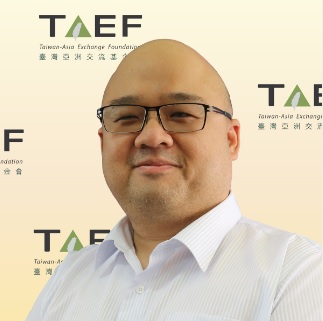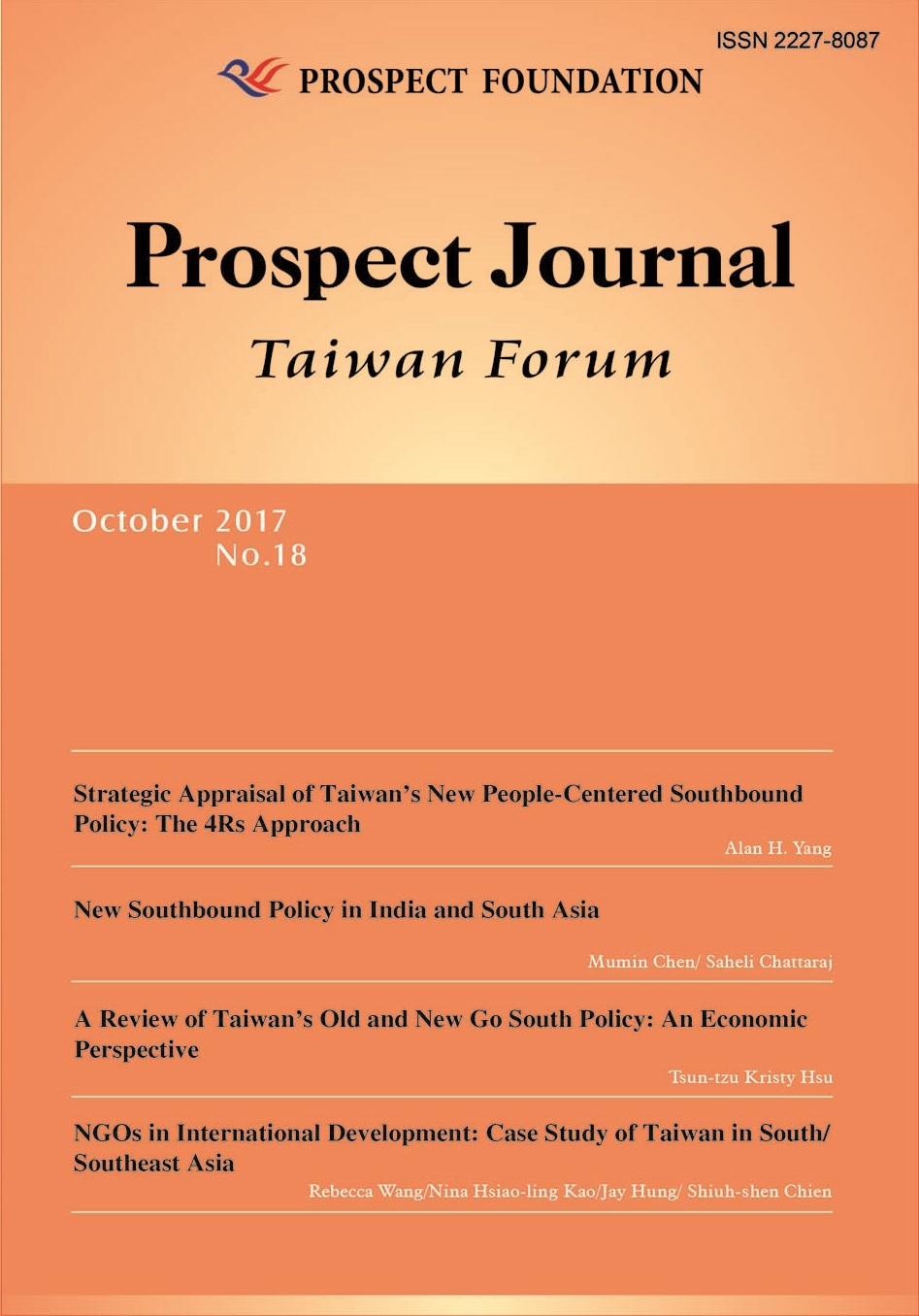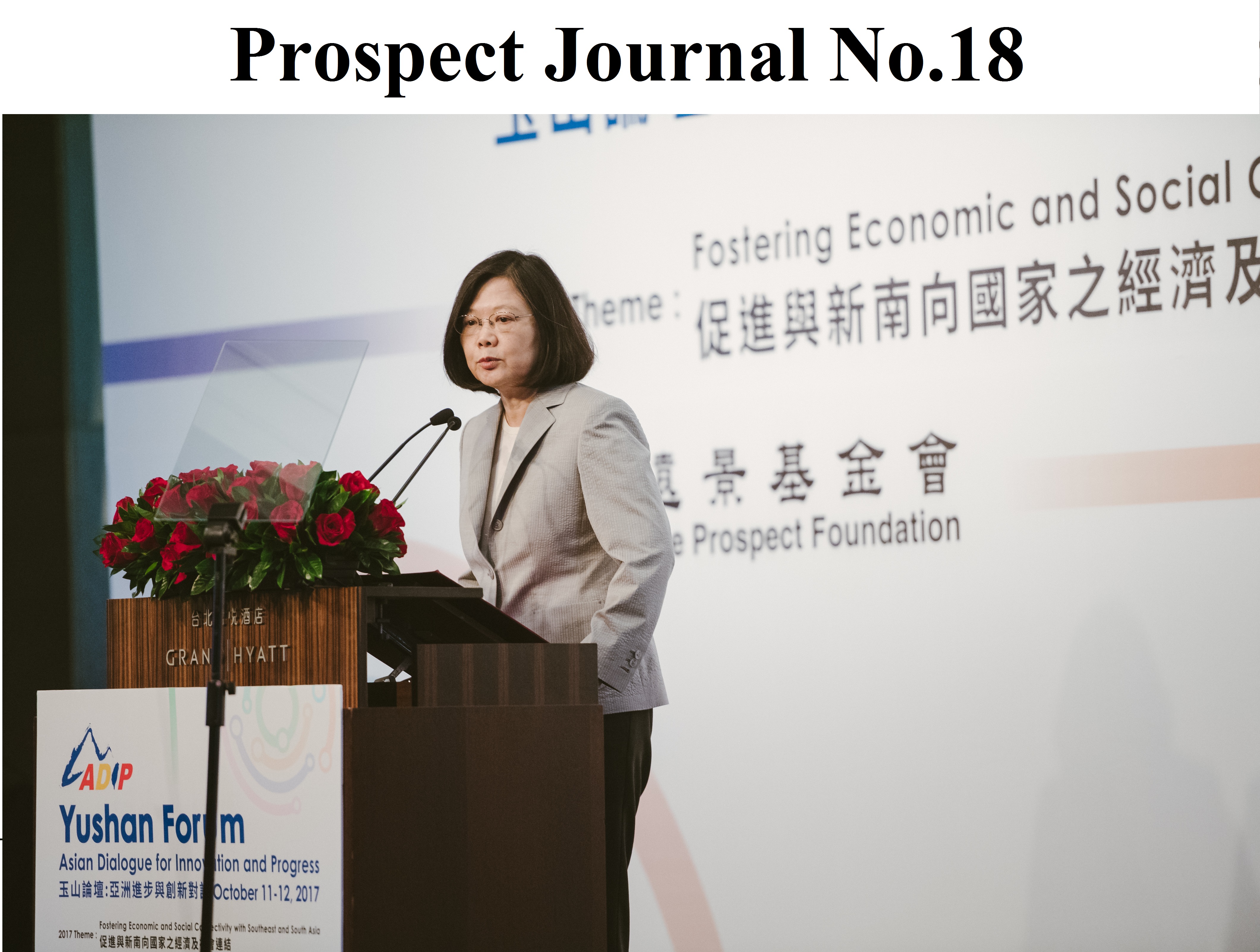Prospect Journal No.18
- PDFStrategic Appraisal of Taiwan’s New People-Centered Southbound Policy-- The 4Rs Approach--楊昊.PDF
- PDFNew Southbound Policy in India and South Asia--陳牧民、Saheli Chattaraj.PDF
- PDFA Review of Taiwan’s Old and New Go South Policy-- An Economic Perspective--徐遵慈.PDF
- PDFNGOs in International Development--Case Study of Taiwan in South、Southeast Asia--王金英、高小玲、洪智杰、簡旭伸.PDF
Prospect Journal No.18 (October 2017)
President Tsai Ing-wen attended the Yushan Forum and delivered the opening remarks. Source: Prospect Foundation.
With the "New Southbound Policy" as the main item of its foreign policy, the government of Taiwan is keen to cooperate with Southeast and South Asia. This issue of the Journal features essays by invited scholars who are long-term observers on the "Go South" policy of Taiwan and overall political, economic and NGO circumstances in Southeast and South Asia. The essays also provided policy suggestions to serve as a reference for think tanks worldwide.
People-Centered Southbound Policy: The 4Rs Approach
Taiwan has adopted various regional initiatives designed to shape the strategic, economic, and trade layout in the Asia-Pacific region, leading Taiwan to pursue constructive partnerships and establish mutual understanding with its neighbors. The New Southbound Policy promoted since 2016 is the flagship foreign policy of President Tsai Ing-wen with the purpose of deepening Taiwan's engagement in ASEAN-led regional communities and networks. Its practice envisages the relations between Taiwan and regional counterparts in Southeast Asia, South Asia, Australia and New Zealand being transformed from a "profit-centered" to a "people-oriented" rationale that takes into account practical needs and actions of the region and localities simultaneously. As the Policy has been implemented for over a year, this article adopts the 4Rs approach to examine its development and effectiveness by scrutinizing how the Policy and related initiatives have been promoted and the preliminary results that have been achieved. It concludes by making policy recommendations through a "4Ps" approach, that is, to boost the momentum of public diplomacy, to making more efforts to explore and consolidate solid partnerships with regional stakeholders, to demonstrate proactively Taiwan's longterm contribution to the region, and to prioritize institutional links and agreements with regional counterparts.
Keywords: the New Southbound Policy, Tsai Ing-wen, the Democratic Progressive Party, ASEAN, ASEAN Community
New Southbound Policy in India andSouth Asia
Aimed at building a comprehensive partnership with ASEAN, South Asia, Australia, and New Zealand by promoting regional exchanges and collaboration, the New Southbound Policy is considered the new grand strategy of President Tsai Ing-wen to reposition Taiwan in Asia and to establish multiple social and business links with Southeast Asia and the Indian subcontinent based on the principles of equality and reciprocity creating more opportunities to sustain existing paths. This paper examines Taiwan's relations with South Asian countries under the influence of the New Southbound Policy and discusses the problems and challenges for future cooperation. By providing an overview of the New Southbound Policy, the paper assesses and examines its function in different sectors before analyzing Taiwan's relations with South Asian states, particularly India. On Taiwan-India relations, the paper suggests that Taiwan should initiate a biennial meeting of ministers/special envoys with India, initiating ECA talks, and look for cooperation with Indian film industries. As for cooperation with other South Asian countries, the Taiwan government may choose to take advantage of its unique skills and strengths, like developing talent in agriculture and food-processing to provide knowhow to initiate programs in the region. Public health or disaster relief and management are areas with potential for building partnership since such areas generally would not be focused on by mainland China in the South Asian region.
Keywords: New Southbound Policy, Foreign Policy of Taiwan, Taiwan-India Relations, Relations between Taiwan and South Asian countries, Tsai Ing-wen
A Review of Taiwan's Old and New Go South Policy: An Economic Perspective
The New Southbound Policy was officially announced by President Tsai Ing-wen in her inaugural address on May 20, 2016, to formalize the Democratic Progressive Party's proposal initiated during the presidential election campaign to enhance relations with Southeast Asia, or the Association of Southeast Asian Nations, South Asia, Australia, and New Zealand. The New Southbound Policy often is compared with the previous governments' policy in the 1990s and 2000s but regarded to have different agenda and policy goals. Thus, the New Southbound Policy is a renewal of the old versions but with new elements and different priorities. The policy has seen full implementation since January 2017. Although time is needed to evaluate the overall effects, some positive progress has been seen in student exchanges and tourism. The policy needs to respond to the changing international geopolitical and economic environment. In addition, it also needs to respond to target countries' future development plans and regional economic integration, including the RCEP, which may conclude trade negotiations in the end of 2017 or early 2018. To help the business community better engage in the region and improve competitiveness, the government also needs to consider a revised FTA strategy to develop bilateral ECAs/FTAs and participate in regional trade agreements
Keywords: Go South Policy, New Southbound Policy, ASEAN, AEC, RCEP
NGOs in International Development: Case Study of Taiwan in South/ Southeast Asia
Nina Hsiao-ling Kao
Non-government organizations have long taken part in international development. Since the 1980s, they have rapidly grown into key players, engaging in emergency rescue, democracy building, conflict resolution, human rights, community building, environmental protection and other areas. This trend is also happening in Taiwan, where even prior to the New Southbound Policy most Taiwanese NGOs involved in overseas aid focus their services on the Asia Pacific region. However the government has failed to provide sufficient legislative cooperation and financial support, partly because of no diplomatic allies in New Southbound countries. This paper argues the Taiwan government should recognize NGOs as an important means of spreading the values of Taiwanese civil society, and draw on the UN Sustainable Development Goals as a core concept of cross-sectoral"smart diplomacy." Concrete recommendations include: (1) build trusting partnership relations to realize civil participation, (2) establish a mechanism to monitor official development assistance, (3) reform overseas aid legislation and policies to plant the roots for a longterm development plan, (4) create an Asian humanitarian aid platform, (5) invest in long-term international youth volunteering, (6) lobby for corporate social responsibility in foreign investment by overseas Taiwanese corporations, and (7) encourage the Taiwanese government, private and civil society sectors to actively engaged a south-south development cooperation.
Keywords: Non-Governmental Organizations, International Development, Sustainable Development Goals, South-South Development Cooperation, Smart Diplomacy
全文下載






